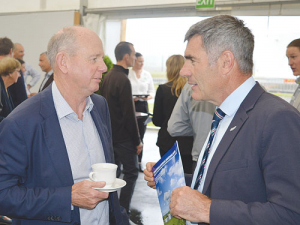Another Windfall for Fonterra Farmers, Unit Holders
Fonterra farmer shareholders and unit holders are in line for another payment in April.
 Fonterra Shareholders Fund chairman John Shewan chats with National’s agriculture spokesman Nathan Guy at the co-op’s annual meeting earlier this month.
Fonterra Shareholders Fund chairman John Shewan chats with National’s agriculture spokesman Nathan Guy at the co-op’s annual meeting earlier this month.
Large investors are walking away from Fonterra Shareholders Fund (FSF) as the co-op grapples with its financial performance.
Last year 13% of the fund’s institutional investors cashed out, fund chairman John Shewan told its annual meeting in Auckland last week.
With Fonterra having paid only 10c/share dividend to unit holders in 2017-18, investor interest is waning ; units on issue were down 101 million over the previous year and market capitalisation dropped $493 million. As at November 6, 2018, 6.3% of Fonterra shares were on issue.
Shewan told about 60 fund investors at the annual meeting that Fonterra must lift its performance and profitability to regain market confidence.
“If Fonterra turns its performance around and delivers its 25 - 35c dividend per share this financial year, and if institutional investors are confident about the future profitability of Fonterra, we can expect the unit price to improve and drive more institutional demand,” he said.
“At the moment the small size and capitalisation of the fund means there is reduced interest from large investors.
“So if the performance improves and the unit price goes up, market capitalisation will grow and we can expect to see more institutional investors coming back on board.”
Shewan noted there was increased interest from farmers and retail investors; however, some farmers were also buying units and converting them back into co-op shares.
The FSF acquires economic rights of Fonterra shares and issues units to investors; returns are based on the financial performance of the co-op. It was set up under the Trading Among Farmers (TAF) share trading scheme.
Fonterra recorded a net loss of $196m last year, it’s first-ever loss. During the 2017-18 year, the FSF unit price hit a high of $6.66/share on January 11, 2018 and a low of $4.50 on October 10. Last week the unit price was hovering around $4.82/share.
FSF unit holders questioned Fonterra’s farmgate milk price calculation and whether it allowed a higher share of payment to farmers at the expense of unit holders.
Shewan told the meeting the milk price manual was subject to regulatory oversight by the Commerce Commission. “The overall milk price mechanism is robust and fair to unit holders,” he says.
He also played down media comments that TAF presented a conflict between shareholder interests and investor interests.
“It’s not about them and us; we are all in this together,” he said.
Shewan says FSF unit holders are watching the asset review underway in Fonterra in the hope that it will help the co-op lift its profitability.
Fonterra chief executive Miles Hurrell told the meeting the co-op is planning to reduce its debt levels by $800m this financial year.
“Our capital expenditure is set at $650m for the current year -- a reduction of $211m; we are reviewing all discretionary [spending] initiatives in the pipeline and challenging all spending to help us achieve this.”
Hurrell says it is aiming for a return on capital that is “respectable within a global co-op environment [and] I can assure you it does not start with a six.”
Fonterra chairman John Monaghan told the investors that the asset review is well underway; a review of three assets including the Beingmate investment will help reduce debt by $800m.
Shewan stays on
Fonterra shareholders Fund chairman John Shewan was re-elected to the board for another term.
Former Fonterra director Nicola Shadbolt also leaves the FSF and will be replaced by Fonterra director Donna Smit.
The FSF board comprises Shewan, Smit, Fonterra’s independent director Scott St John and unit holder nominees Pip Dunphy and Kim Ellis.
Global trade has been thrown into another bout of uncertainty following the overnight ruling by US Supreme Court, striking down President Donald Trump's decision to impose additional tariffs on trading partners.
Controls on the movement of fruit and vegetables in the Auckland suburb of Mt Roskill have been lifted.
Fonterra farmer shareholders and unit holders are in line for another payment in April.
Farmers are being encouraged to take a closer look at the refrigerants running inside their on-farm systems, as international and domestic pressure continues to build on high global warming potential (GWP) 400-series refrigerants.
As expected, Fonterra has lifted its 2025-26 forecast farmgate milk price mid-point to $9.50/kgMS.
Bovonic says a return on investment study has found its automated mastitis detection technology, QuadSense, is delivering financial, labour, and animal-health benefits on New Zealand dairy farms worth an estimated $29,547 per season.

OPINION: Here w go: the election date is set for November 7 and the politicians are out of the gate…
OPINION: ECan data was released a few days ago showing Canterbury farmers have made “giant strides on environmental performance”.